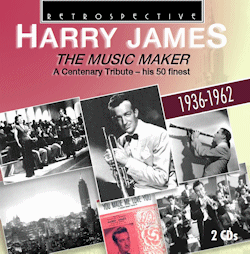CD1 (1936-1941)
1 Spreadin’ Knowledge Around
2 I’m Coming, Virginia
3 Peckin’
4 Just A Mood
5 Sugarfoot Stomp
6 Jubilee (With Helen Humes)
7 Life Goes To A Party
8 Texas Chatter
9 One O’clock Jump
10 Out Of Nowhere
11 Big John’s Special
12 I’m In The Mood For Swing
13 They Say (With Billie Holiday)
14 Boo-Woo
15 Woo-Woo
16 Ciribiribin
17 Two O’clock Jump
18 I’ve Found A New Baby
19 Feet Draggin’ Blues
20 All Or Nothing At All (With Frank Sinatra)
21 Sleepy Time Gal
22 Flash
23 Concerto For Trumpet
24 Back Beat Boogie
25 The Flight Of The Bumble Bee
26 I’ll Get By (With Dick Haymes)
CD2 (1942-1962)
1 You Made Me Love You
2 Yes, Indeed! (With Dick Haymes)
3 I Don’t Want To Walk Without You (With Helen Forrest)
4 Strictly Instrumental
5 By The Sleepy Lagoon
6 Trumpet Blues And Cantabile
7 Easter Parade
8 Crazy Rhythm
9 Cherry
10 I Had The Craziest Dream (With Helen Forrest)
11 I’ve Heard That Song Before (With Helen Forrest)
12 I’m Beginning To See The Light (With Kitty Kallen)
13 I’m Confessin’
14 It’s Been A Long, Long Time (With Kitty Kallen)
15 I Can’t Begin To Tell You (With Betty Grable)
16 Cotton Tail
17 Tuxedo Junction
18 Would I Love You, Love You, Love You? (With Doris Day)
19 You’ll Never Know (With Rosemary Clooney)
20 Lush Life
21 Ring For Porter
22 Harry, Not Jesse
23 My Inspiration
24 Weather Bird Rag
Harry James (trumpet) with The Dean and his Kids; Teddy Wilson and his Orchestra; Benny Goodman and his orchestra; Harry James and his orchestra; Lionel
Hampton and his orchestra; Harry James and his Boogie Woogie Trio; Harry James and his sextet; Harry James and his Octet and Septet
[79:25 + 79:51]
There’s certainly no shortage of Harry James out there and there never has been. This twofer, however, is released to acknowledge the centenary of his
birth on 15 March 1916 and the compilation traces him from his youthful debut as a 20-year old to two tracks made in a July 1962 session. He was to die of
cancer over twenty years later, in July 1983.
He emerged on the musical shore like Venus on her shell, fully formed. His bristling brio can be savoured as he leads The Dean and his Kids – a band
including such outstanding players as Irving Fazola, Dave Matthews, Freddie Slack, and Ben Pollack (The Dean) anchoring them – in Spreadin’ Knowledge Around. The first disc, indeed, is a parade ground of elite colleagues and outstanding music making. He was soon recording
with Teddy Wilson (and Billie Holiday – They Say is here) and obviously with Goodman and established his own orchestra soon after. By 1937 he was
making sides with a contingent from Basie’s band including Buck Clayton, Herschel Evans, Walter Page and Jo Jones – they were members of James’ Orchestra
for recording purposes, but it’s an amazing tribute to his cachet that at 21 he could stand shoulder to shoulder with them. His solo on One O’Clock Jump is an outstanding example of virtuosity, range, and power.
The two Boogie sides Boo-Woo and Woo-Woo with Pete Johnson on one side of the record and Albert Ammons on the other launched a thousand
replicas but he was also a master of legato, his deep rich tone infusing many a song – and with that on-the-cusp eruptive feeling that so often flared up
into the realism of bravura showmanship. He also had a blowsy, almost ironic approach at times, with an admixture of klezmer chutzpah – I always think that
one eyebrow is arched in his solo on You Made Me Love You from 1941 – but he and his band provided diligent support to the steady stream of
vocalists that he worked with; Dick Haymes, Helen Forrest, Kitty Kallen, Betty Grable, Rosemary Clooney, Doris Day and indeed Sinatra among them. They are
all represented here, and rightly so.
There are some pleasing oddities along the way. Jack Matthias arranged Eric Coates’ By The Sleepy Lagoon for example, and James couldn’t escape
either the Jazzin’ the Classics vogue – Rimsky’s pesky Bee – or Concerto-itis in Concerto for Trumpet, his own brilliant self-examination of
technique and stamina. Some slush is inevitable but set against that there can be found wonderful nuggets such as Willie Smith’s alto solos with James’s
1947 small groups. Stereo was perfect for James and its spatial effects can be heard in the last 1962 session in which he goes back to basics, delivering a
fine salute to King Oliver and Louis Armstrong on Weather Bird Rag in Matty Matlcok’s arrangement. The album from which it derives perhaps carries
with it echoes of Louis’ own Musical Autobiography LPs of a few years earlier.
Digby Fairweather’s customarily scrupulous and insightful notes complement this fine and well transferred salute in excellent fashion.
Jonathan Woolf
